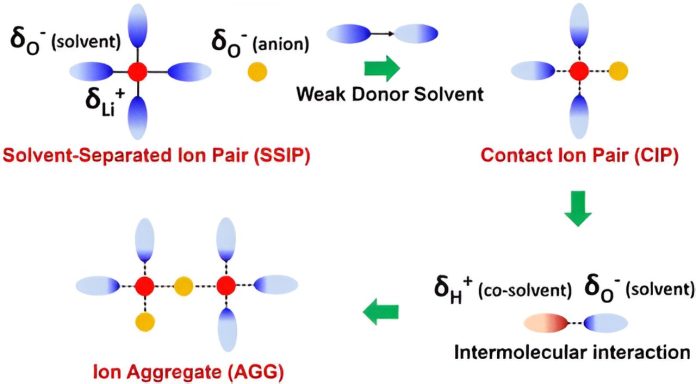
Electric vehicles, large-scale energy storage, polar research, and deep space exploration require batteries that perform well even in very cold temperatures.
Lithium metal batteries, known for their high energy capacity, are promising candidates for these needs.
However, traditional electrolytes used in these batteries face challenges in low temperatures, where strong interactions between solvent molecules and lithium ions (Li+) hinder performance.
A research team led by Professor Li Feng from the Institute of Metal Research of the Chinese Academy of Sciences has developed a new type of electrolyte that addresses this issue.
Their findings, published in the Journal of the American Chemical Society, show that this new electrolyte can significantly improve the performance of lithium metal batteries in cold environments.
The team focused on the energy of oxygen bonds in the solvent, which is crucial for ionic coordination and transport across the battery interface.
They studied different oxygen bonds—such as those in sulfone (S=O), ester (C=O), and ether (C–O)—to understand their impact on the electrolyte’s structure and temperature adaptability.
After extensive testing, they selected tetrahydrofuran-based ether solvents, which have weak oxygen bonds.
They further reduced the interaction between Li+ and the solvent by incorporating fluorinated solvents, which form hydrogen bonds with the ether molecules.
This combination speeds up the desolvation process of Li+ and minimizes the negative effects of solvents on interfacial transport and stability.
The result was a highly stable lithium metal battery with 100% capacity retention after 150 cycles, even at temperatures as low as -20°C and -40°C. This makes it one of the most reliable low-temperature lithium metal batteries reported to date.
The new electrolyte strategy not only enhances battery performance but also opens new possibilities for developing advanced batteries for cold environments.
This research provides a novel approach to electrolyte design, ensuring that lithium metal batteries can meet the high demands of various applications, from electric vehicles to space exploration, even in the harshest conditions.
Source: Chinese Academy of Sciences.



